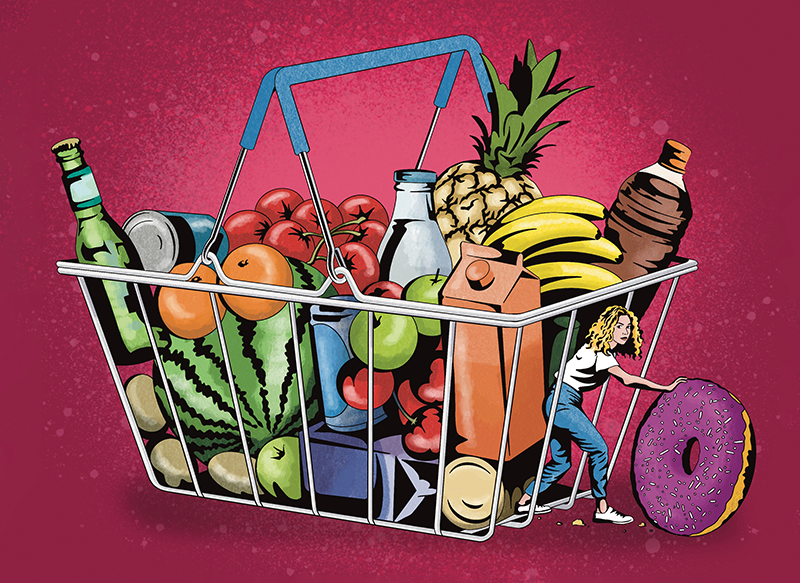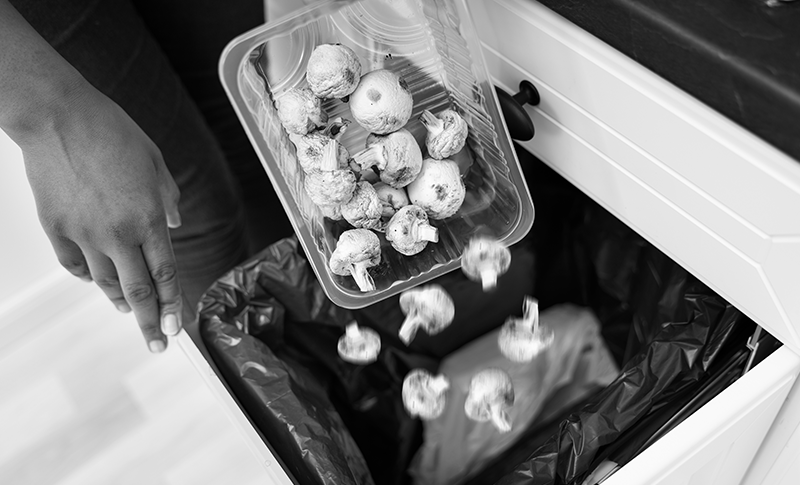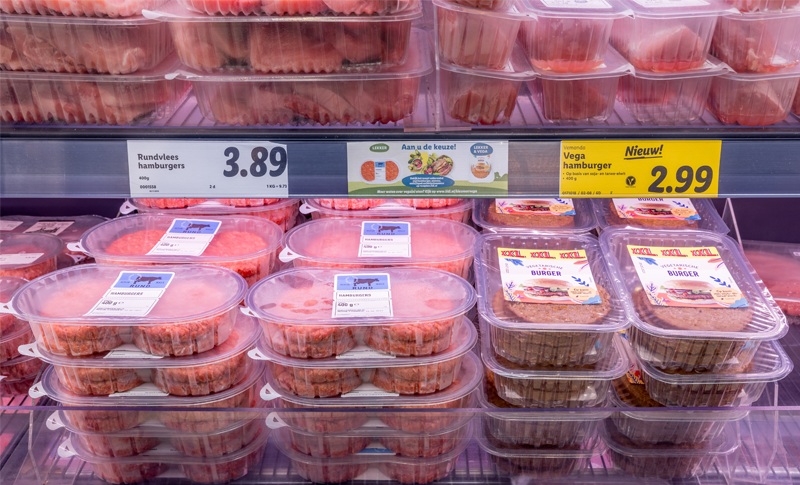Necessity, the fun of it, indifference, justice: students who shoplift in the supermarket have various ways of justifying their behaviour. And the introduction of the self-scanner is making it even easier to steal. The theft rate has increased a lot in recent years. Student editor Ananya Doraswamy talked to fellow students about why they steal and to Consumption sociologist Hans Dagevos.
Text Ananya Doraswamy en Luuk Zegers
It’s just an ordinary day in the supermarket. Steve* is queueing at the self-checkout with a bag of crisps and a beer in plain view. What you can’t see are the products he doesn’t intend to pay for – he’s hidden those in his jacket. A few minutes later, he walks out without anyone noticing what he’s done. ‘It started as a way of supplementing my small student budget,’ says Steve. ‘Nowadays I do it more for kicks; to see if I can beat the system and how far I can go. Stealing in the supermarket has become a habit for me. I ought to stop doing it: I don’t actually need to do it anymore for myself. Sometimes I take things for my housemates or friends who need something.’
Organic products
Steve is not the only one who occasionally steals from the supermarket. Shoplifting has increased a lot since the large-scale introduction of the self-checkout (see inset). Shoplifters often don’t even bother to hide the items they are stealing like Steve did: they just ‘forget’ to scan certain products. Mark* is another student who shoplifts occasionally, mainly food items. ‘The pricier organic products. I think the supermarkets calculate losses due to shoplifting into their prices, and they are also insured. And they throw out so much fresh food themselves – that is the real crime.’
Margot* describes herself as an opportunistic shoplifter. ‘I only steal occasionally. Actually only if the risk of getting caught is extremely small. If you get caught, you get banned from the shop and fined about 200 euros. So in a place like Wageningen, where there aren’t many supermarkets, you’ve got to be careful.’
Expensive bananas
All three students say that they see shoplifting as unethical, essentially. They would never steal from a small retailer. But they don’t feel that this principle applies to the big supermarket chains. ‘Supermarkets make such big profits that it doesn’t really matter what I steal,’ says Steve. Margot: ‘Some supermarkets have such high prices that they are practically daring people to start shoplifting. How can you justify charging one euro for a banana?’ Mark too is not surprised that shoplifting has increased. ‘Everything has got more expensive in the past few years. Food shouldn’t be allowed to be so expensive.’
Supermarkets make such big profits that it really doesn’t matter what I steal
‘I haven’t done research on shoplifting, so it isn’t my field of expertise,’ says Dagevos straightaway. ‘But it is interesting to ponder it. I think that the self-checkouts make shoplifting easier; that consumers – including students – may be irritated by the rising prices, which make it easier for people to justify “taking something back” in their own minds; and that people increasingly see food as a standalone product, without seeing the links between food and farmers, nature, natural resources and animals.’
Anonymous shops
‘And as a sociologist I am immediately reminded of the famous book The McDonaldization of Society, by the American sociologist George Ritzer,’ he adds. ‘Ritzer talks about “dehumanization”: the way the cashier is replaced by the self-checkout in the name of efficiency.’ The students who are quoted above see stealing from supermarkets as different to stealing from small businesses. ‘That shows that people don’t like large-scale retail,’ says Dagevos. ‘Retailers prefer to talk about the financial impact of theft, but there may be other hidden factors behind the increase in shoplifting. Everything has become anonymous: who on earth is Jumbo, Dirk, or Albert Heijn? Once you get rid of checkout operators, the shop becomes faceless. That doesn’t make it okay to steal, but it helps shoplifters justify their actions to themselves.’
Everything has become anonymous: who on earth is Jumbo, Dirk, or Albert Heijn?
Ritzer also introduced the concept of ‘prosumption’, says Dagevos. ‘A combination of production and consumption. It includes all the developments towards self-service in the shop. Retailers present these developments as efficient and time-saving for the customer but there’s something in it for them too: they can save on checkout personnel. Because we take over the checkout process from the supermarket, we are actually doing that work for them. I can imagine that some shoplifters use that as an excuse: if I’ve got to work for you, I want to get something out of it.’
Excuses
All in all, many shoplifters are probably not in it for the money, suggests Dagevos. ‘It’s a relationship issue. The self-checkout has made the link between customer and shop even more impersonal than it already was. What is more, the self-scanner makes stealing a lot easier because the line between forgetting to scan something and intentional theft is fuzzy. It’s easy to find an excuse.’
The self-checkout has made the relationship between customer and shop even more impersonal
The measures announced by Jumbo supermarkets, with for example more and smarter camera surveillance (see inset), also fit the picture of McDonaldization, says Dagevos. ‘Jumbo is opting for even more technology instead of seeing how they could improve relations with customers. One way of doing that is through initiatives with a social objective, like the staffed checkouts where lonely seniors can have a chat. You’d have to come up with something else for students, but with that kind of initiative you work on improving customer relations. If those relations improve, there will probably be less theft.’
The rise in shoplifting
– Early this year, Jumbo supermarkets announced that more than 100 million euros’ worth of goods was stolen from their 725 branches in 2023 – amounting to an average of 140,000 euros per shop. That amount was the same as Jumbo’s overall annual profits. Other supermarket chains don’t publish any data about shoplifting, but nationwide police data show that it is a growing problem across the board. Managers of Wageningen supermarkets acknowledge that there is a problem here too, but prefer not to respond to Resource’s questions and refer us to their head office.
– The self-checkout has become commonplace in the Netherlands since 2020. In 2023 in Wageningen, the number of shoplifting charges reached the highest point (97 charges) since the police started publishing this data in 2012. The years 2022 (84 charges) and 2020 (83 charges) are in second and third place.
Between 2012 and 2019 (before the era of self-checkouts) there was an annual average of 51 charges of shoplifting in Wageningen. Since 2020 the annual average has been 81.
– Research by the RTL News panel (among 21,000 participants) shows that 7 per cent of consumers using the self-checkout deliberately take the odd item without paying for it. Among young people (18 to 35), the figure is 11 per cent.
– Jumbo has announced extra measures, including more camera surveillance. The chain is also experimenting with ‘smart’ camera surveillance which uses artificial intelligence to flag up suspicious behaviour.
*Names have been changed; real names known to the editors.

 Some supermarket charge such high prices that they are practically daring people to start shoplifting.’ Illustration Valerie Geelen
Some supermarket charge such high prices that they are practically daring people to start shoplifting.’ Illustration Valerie Geelen 
